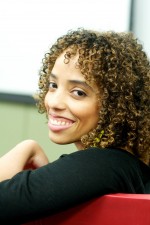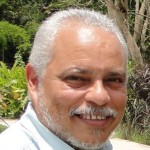
The following interview is shared with you by both Dena Simmons and Isaac Graves. To learn about this interview series and reproduction, citation, and copyright information, please click here. To find out more about Dena Simmons and her work, watch her TEDx talks, "What to do if a student comes at you with scissors?" and "It's 10PM. Do you know where your children are?" You can follow Dena on Twitter at @denasimmons.
PART ONE
 Isaac Graves: What does community mean to you?
Isaac Graves: What does community mean to you?
Dena Simmons: Community means sharing, collaborating, helping, respecting, supporting, and caring for others. Community is fellowship and belonging. Community could be based on geography, spirituality, race/ethnicity, values, sexuality, and the list goes on. As a result, I am a part of many different communities because of where I live and work and because of who I am. Additionally, building the type of community we want takes careful thought and hard work; it involves ensuring that all voices are valued, included, and protected and that none are excluded, ridiculed, or threatened.
IG: How does community play out in your life?
DS: In my life, and especially in my work in health, education, and public service, I collaborate, share, help, support, respect, and care for others and vice versa. Without my multiple communities, without others, my work would not be as seamless or possible as it is or has been. I appreciate being able to have the foundation and support of my many communities to take risks and to do the work about which I care. Everything I do, I do with my multiple communities in some way. My communities challenge me, keep me humble and honest, and push me to strive for my best. However, what I have found in my membership in more than one community is that some communities could be quite insular and could possibly benefit by collaborating and being open to learning from other communities.
IG: What do you find most meaningful about community?
DS: The most meaningful aspect of community is having support and guidance from others. I also believe that cultural awareness and diversity in a community allow us to grow, to learn, and to challenge ourselves accordingly. I feel blessed to say that I feel a part of multiple communities that sustain my growth to be a better me. My communities have provided me with a sense of belonging and of self—and with a strong foundation so that I can take risks with the knowledge that I’ll be held.
IG: What's missing in community?
DS: If I have to think of something missing from community in my life, I can’t help focusing on my geographic community. As a child growing up in the Bronx, nothing about where I lived sent the message to me or to my community members that we mattered. Our buildings were run down; our schools and hospitals were sub-par; our neighborhoods were unsafe, and the police did not respond promptly to safety concerns. That said, I can’t help thinking about how certain geographical communities lack access to quality schools and healthcare, to healthful food options, and to an infrastructure that allows for healthful living and a better quality of life. In my current community and the one in which I grew up, this inequality of resources is a sad reality. So, what is missing from community in my life is the resources needed to ensure a good quality of life and superb educational and healthcare options not just for the most privileged, but for all.
IG: What is an ideal community to you?
DS: I think what is ideal for me might not be ideal for someone else. Our idea of community depends on our identity and life experience. For me, my ideal community nourishes the mind, body, spirit, and soul; it provides opportunities and resources for individuals to realize their goals and have optimal quality of life, to live harmoniously with others, to contribute by filling in gaps in the community, to have a foundation of love, support, and respect.
"For me, an ideal education empowers all involved—the student, the teacher, the parents/guardians, the administrator, and the community. It is democratic, engaging, fun, liberating, culturally responsive, and allows all to feel safe, loved, and a part of a community. It is not confined to the walls of a classroom or school, and it allows individuals to learn by doing."
—Dena Simmons
PART TWO
IG: What does a democratic education mean to you?
DS: Democratic education is education that allows all parties involved to have a voice in how education happens. Democratic education is education that empowers all. It is culturally responsive; it validates students; it emancipates them. Democratic education provides students with the space to take ownership of their learning, and it allows school staff to guide students to achieve their goals.
IG: How does education play out in your life?
DS: My mother came to this country from Antigua. As a Black immigrant and single mother, she faced her share of injustices simply because of who she was. Nonetheless, my mother worked hard so that she could send my two sisters and me to the neighborhood parochial school. Watching my mother struggle to find educational opportunities for my sisters and me instilled in us the importance of education. My mother inspired me to provide others with what she provided us—a better life through education.
However, I had to leave the Bronx in pursuit of quality educational options. I attended boarding school in Connecticut and college in Vermont on full scholarships. After college, I returned to the Bronx as a middle school teacher because I always wanted to return to the community that motivated me to be who I am today. I wanted to provide my students with quality education that gave them access to a better life. I wanted to be a role model to other children like me.
In sum, I view education as a way to empower others, especially based on how education has empowered me. Education was my way to gain access to a better life, to open doors of opportunity, and to earn social and cultural capital. For others, these privileges are given, but I had to earn mine. Education gave me access to resources so that I could strive for more and so that could do more for others. For that, the power of education will always have a primary role in my life.
IG: What do you find most meaningful about education?
DS: Education has the power to change a person’s life for the better. It empowers individuals with the knowledge they need to advocate for others and for themselves and to fight societal injustice—that’s what’s most meaningful about education to me.
IG: What's missing in education?
DS: In the current educational climate, we are so invested in the rhetoric of “reform,” so caught up in the pressure of “student achievement.” Consequently, we lose the now-ness in our pedagogy. We focus on state assessments in April and fear school closures in June. We are encouraged to obsess over test scores, which diminishes our work and dehumanizes students. In the process of standardizing students, we lose them. We lose ourselves. That is, we have lost the humanity and nowness in our work. In bringing students to academic and life success, we must educate the whole child, keeping in mind not only how well they do on academics, but also their social and emotional well-being and overall health needs.
IG: What is an ideal education to you?
DS: Again, what is ideal for me might not be the case for someone else, but for me, an ideal education empowers all involved—the student, the teacher, the parents/guardians, the administrator, and the community. It is democratic, engaging, fun, liberating, culturally responsive, and allows all to feel safe, loved, and a part of a community. It is not confined to the walls of a classroom or school, and it allows individuals to learn by doing. It involves opportunities for all to collaborate and to teach and to learn from each other. It provides students with the skills and knowledge they need to be successful on their own terms, and it provides the school with the resources and opportunities to contribute and to engage in the larger community.
IG: What do you think people should know about the relationship between community and education?
DS: I don’t think education could be devoid of community. To me, part of education is community. The ability to learn collaboratively and to work with others enriches our lives and education. Human beings are social beings, and education should happen with, around, in, and a part of a community.
IG: Is there anything else you would like to share on community or education?
DS: It is important to consider class, and especially race, when we talk about education in our country. We have to ask ourselves: who has access to progressive or democratic education? Who has access to private school education? And, who has access to public school education? We must also consider how where we live and who we are might impact our schooling. Additionally, when we talk about education reform, we must also ask: education reform for whom? Many education reformers spit jargon about opportunity and achievement gaps without a nuanced discourse of the history of white supremacy in our country. Without acknowledging the impact white supremacist ideals have had on the education of youth of color, we are carelessly doing more damage than good by erasing our students’ histories, identities, and cultures—and sending them the message that their lives do not matter.



 Isaac Graves: What does community mean to you?
Isaac Graves: What does community mean to you?
 Isaac Graves: What does community mean to you?
Isaac Graves: What does community mean to you?
















